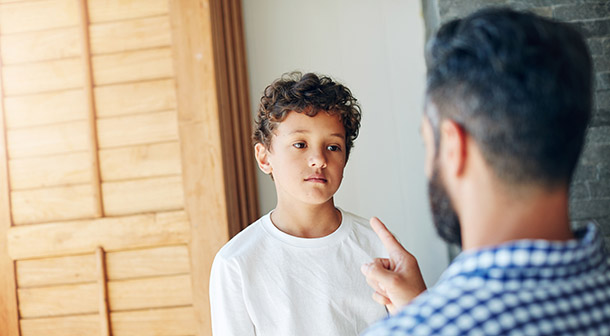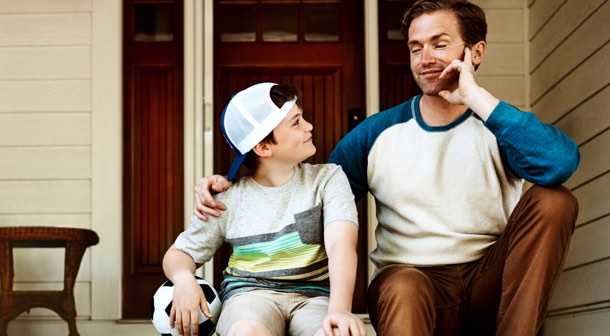How to Stop Rude Tween Behavior
By Charity Eames, LPC-S, LMFT-S
Read Time: 5 Minutes
Tween attitude is often at its worst when tweens are with the people they feel safest with - their family. It's hard to keep the house stress-free as your tweens adjust to their changing world and surging hormones. At ages 9-12, tweens aren't children anymore, but they're not young adults either. Your kids may suddenly start to push against boundaries during their tween years. Tween behavior commonly includes sarcastic remarks, eye-rolling, backtalk, sudden outbursts, door slamming, and sullen silences.
Talk to your Tween
Many families find it helpful to involve their tweens in the process of making family rules and behavior guidelines. Sit down as a family and talk about how you want to treat each other and what kind of behavior is acceptable. Discuss your expectations for each other and what the consequences should be for not meeting these expectations. You can even create a behavior contract that outlines your family's rules and have everyone sign it. When tweens are involved in the process of setting up behavior guidelines they feel like their concerns and input are being heard. This makes them more likely to follow the rules and limit bad tween attitudes.
Don't try to make your kids think you're cool. Your job is to be the parent.

Need parenting help now?
The Texas Parent Helpline is available 24/7.
- Call 833-680-0611
- Chat with us
- Text 833-680-0611
Set the rules and punishments
Choose tween-appropriate punishments.
It may not be easy but consider sitting down as a family to establish what the consequences will be for breaking family rules. Unlike younger children, many tweens care less about small rewards or punishments. When tweens behave badly, most parents find it effective to remove a favorite activity like cell phone privileges or going to a friend's house.
Mean what you say and follow through.
Don't say things you don't really mean, like telling your tween he is "grounded for life." If you keep your rules and punishments realistic and consistent, tweens will learn that rude behavior leads to negative consequences.
Show the respect you want to see in your tween.
You are your child's first and best role model, and he (or she) looks to you for what it means to be an adult. Children model their communication on yours, so do your best to listen and not interrupt or insult your tween. One of the greatest gifts you can give is to show your children what respect looks like. Even when you're hit with disrespectful tween attitude, try to be calm and remind your tween that rude behavior is not acceptable. You might also remind him that you are human too, and you can also have hurt feelings.
Pick your battles!
They aren't all equal. Harmful behavior is likely worth a confrontation, but self-expression like new hair styles or clothes may not be worth a fight.
Cool off.
When feelings get heated, it's okay to give your tween - and yourself - a minute to calm down. Going to separate rooms for 15 minutes can help everyone communicate more calmly and clearly. After emotions have cooled off, make sure you finish the conversation and address the behavior issues.
Plan some face-to-face time.
The easiest way to tell whether a behavior change is temporary or permanent is to spend time with your tween one-on-one. Now that your child is older (and busier with friends and school activities), you might have to look for ways to spend more time together. Invite your tween to walk the dog with you, help with grocery shopping, or just take a drive together. If you do it enough, it will reinforce his trust in you and let him know he can come to you for help. And it is always important to put down your phone, ask questions, and listen when he speaks. Sometimes we just forget the basics when dealing with tween challenges.
Bond as a family.
It's not just one-on-one time that's important. It's also a great idea to take time to be together as a family. Do things together regularly that allow you to talk, laugh, and have fun without cell phones or having other people over. Make and eat dinner together, play a board game once a week, or visit a new spot in town.

Stopping the Rude Tween Behavior
Setting expectations and outlining punishments will go a long way in helping your tween make good choices, but it's not always going to be perfect. How can you manage your tween's changing moods and restore peace at home? Here are some starting points that can help encourage clear, respectful communication and help your tween recognize and stop his rude tween behavior.
Set clear, age-appropriate boundaries.
First, decide what's important to you. Then use those priorities to help you reset your responses and reactions. Once you decide what's most important, try to overlook the little things. For example, you don't have to react every time your tween rolls his eyes or sighs when you give directions.
Address rude tween behavior.
Imagine your tween behaves in an unacceptable way - maybe he stomps off in the middle of a conversation or says something rude to a family member. Calmly and clearly point out the rude behavior and tell your child that it's unacceptable. Don't wait until later to address the issue - it's much more effective to call out problems when they happen so that you can work together to correct them.
Remember that you're the parent.
You are not your tween's friend. You are a parent, and it's your job to stay calm and in control of your emotions and behavior, even if your tween is yelling or slamming doors. Your actions and guidance should make your tweens better people, even if your responses sometimes make them frustrated.

Tween Behavior Charts
If it seems like your tween is having a hard time sticking to the family rules, you might consider creating a tween behavior chart that is appropriate for his age. Behavior charts can provide a visual reminder of your family's guidelines and how well your tween is following them.
Some families find a simple behavior rating system works best. Others prefer to create a more detailed tween behavior chart that also includes chores, daily routines, or other family responsibilities. Some families make it so that privileges - like more screen time - can be earned when tweens complete chores or routines.
Tweens may be too old for a behavior chart with stickers - opt for a system where they earn check marks or tokens instead.
You've Got This
Parenting tweens is not easy, but do your best to model clear, calm communication. This tween phase won't last forever. Be patient and remember that you're teaching your child the skills he needs to be independent and responsible.
Also remember that you don't have to do this by yourself. If you're feeling overwhelmed, get help from your partner, family, or a friend, or contact the Texas Youth Helpline at 1-800-989-6884.




